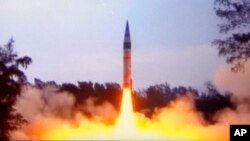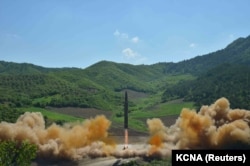A U.N. conference adopted an international treaty banning nuclear weapons Friday, but the world's nine nuclear powers boycotted the proceedings, leaving its impact in doubt.
The treaty — adopted by 122 countries, with the Netherlands voting against it and Singapore abstaining — was greeted with sustained applause and a standing ovation by delegates.
The treaty prohibits states that sign and ratify it from developing, testing, producing, manufacturing or otherwise acquiring, possessing or stockpiling nuclear weapons or other nuclear explosive devices.
It also forbids parties from using or threatening to use nuclear weapons or other nuclear explosive devices.
The treaty will enter into force once 50 states have signed and ratified it.
"This is something historic for humanity," said Ambassador Elayne Whyte Gómez of Costa Rica, president of the U.N. Conference that negotiated the treaty.
"We are just a few moments away from saying to the survivors, to those impacted by nuclear weapons, that after so many decades we have managed to sow the first seeds of a world free from nuclear weapons," she said just ahead of the adoption. "We are just a few moments away from saying to our children, 'Yes, it is possible to inherit a world free from nuclear weapons.' "
North Korean test
The adoption of the treaty came in the same week that nuclear tensions escalated on the Korean Peninsula, highlighting the urgency of the issue.
On Tuesday, North Korea test-fired an intercontinental ballistic missile for the first time, in violation of U.N. resolutions prohibiting it from developing nuclear and ballistic missile technology. The move brought widespread international condemnation, and states are considering whether to further sanction Pyongyang for its behavior.
The treaty on the prohibition of nuclear weapons complements earlier conventions banning biological and chemical weapons, land mines and cluster munitions. Despite being illegal, however, land mines still are frequently used in conflicts, chemical weapons have been used in Syria, and cluster munitions reportedly have been used in Libya, Sudan, Syria, Ukraine and Yemen.
The nine nations that have nuclear weapons boycotted the treaty negotiations, which began in February. They are Britain, China, France, Russia, the United States, India, Pakistan, North Korea and Israel.
The U.N. ambassadors of Britain, France and the United States issued a joint statement after the vote, saying their governments did not intend "to sign, ratify or ever become party" to the treaty. "Therefore, there will be no change in the legal obligations on our countries with respect to nuclear weapons."
The three nuclear powers also noted that other states possessing nuclear weapons and other states relying on nuclear deterrence did not participate in the treaty negotiations.
"This treaty offers no solution to the grave threat posed by North Korea's nuclear program, nor does it address other security challenges that make nuclear deterrence necessary," the ambassadors added. "A ban treaty also risks undermining the existing international security architecture which contributes to the maintenance of international peace and security."
Road to elimination
"Today the international community rejected nuclear weapons and made it clear they are unacceptable," said Beatrice Fihn, the executive director of the International Campaign to Abolish Nuclear Weapons [ICAN], a Geneva-based coalition of more than 450 nongovernmental groups.
Fihn said the treaty was in large part aimed at erasing the image of prestige and power that nuclear weapons convey. She said nuclear-armed countries would see it in their interest to sign on to the treaty when the stigma grew for possessing weapons that indiscriminately kill massive numbers of civilians.
"At some point they are just going to be shameful, really expensive, messy weapons that have no actual military utility," Fihn said. "We see this as really a solid treaty that will set us on a good path toward the elimination of nuclear weapons."
The treaty also provides a path for nuclear states that become signatories to eliminate their nuclear weapons, stockpiles and programs.
It also requires that states assist victims of nuclear weapons use and testing, and it demands environmental remediation of contaminated areas.
The treaty will be open for signatories at a U.N. ceremony on September 20, during the week that leaders gather at the world body for their annual meetings.






